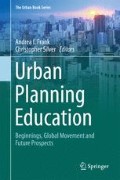Abstract
The chapter examines the factors and drivers influencing planning-related university programs in Estonia. In recent years, both the planning system and academia have been coping with high levels of societal dynamism and transition associated with the assertion of national independence in 1991, while seeking to overcome path-dependencies and to capture and implement innovative planning approaches. A shift from land use to strategic spatial planning requires the introduction of a new knowledge set in respect to balanced interdisciplinary and specialized directions. Results from a survey of planning practitioners illustrate the need for qualified planners, and upskilling of current practitioners who lack of competencies for contemporary planning approaches. Although in the 2000s, the number of quasi-planning degree programs reached a peak at 20 planning-related programs in six universities, the educational provision in the country lacks diversity and remains mostly limited to programs rooted in environmental and engineering disciplines. An alternative model for a cross-university joint planning program advancing the diversity of current programs, widening the array of subjects and depth of scholarship to enhance future qualities of the planning profession for a small European country could not be implemented thus far. However, as a major positive shift in professional advancement, setting professional codes and certification for spatial planners serves as post-curriculum standardization and harmonization of knowledge and skills, as well strengthening planners’ position in the Estonian planning scene.
Access this chapter
Tax calculation will be finalised at checkout
Purchases are for personal use only
References
Adams N (2006) National spatial strategies in the Baltic states. In: Adams N, Alden J, Harris N (eds) Regional development and spatial planning in an enlarged EU. Ashgate, Aldershot, pp 155–181
Adams N (2008) Convergence and policy transfer: an examination of the extent to which approaches to spatial planning have converged within the context of an enlarged EU. Int Plan Stud 13(1):31–49
Adams N, Cotella G, Nunes R (eds) (2010) Territorial development, cohesion and spatial planning: knowledge and policy development in an enlarged EU. Routledge, London
Adams N, Cotella G, Nunes R (2014) The engagement of territorial knowledge communities with European spatial planning and the territorial cohesion debate: a Baltic perspective. Eur Plan Stud 22(4):712–734
AESOP (2010) Quality issues in a changing European Higher Education Area, Planning Education. Association of European Schools of Planning, Leuven Heverlee
AESOP (2013) AESOP yearbook, silver, jubilee edn. Association of European Schools of Planning, Wrocław
Anselin L, Nasar JL, Talen E (2011) Where do planners belong? assessing the relationship between planning and design in American universities. J Plan Educ Res 31(2):196–207
Balchin P, Sykora L, Bull G (1999) Regional policy and planning in Europe. Routledge, London
Edwards MM, Bates LK (2011) Planning’s core curriculum: knowledge, practice, and implementation. J Plan Educ Res 31(2):172–183
Ellis G, Murtagh B, Copeland L (2008) The future of the planning academy a scoping report. Queens University Belfast, RTPI, Belfast
Faludi A (1987) A decision-centred view of environmental planning. Pergamon, Oxford
Frank A (2013) Europeanisation of planning education: an exploration of the concept, potential merit and issues. Revista Brasilera de Estudos Uranos e Regionais 15(1):141–153
Frank A, Mironowicz I, Lourenço J, Franchini T, Ache P, Finka M, Scholl B, Grams A (2014) Educating planners in Europe: a review of 21st century study programmes. Prog Plan 91:30–94
Hartmann T (2012) Wicked problems and clumsy solutions: planning as expectation management. Plan Theory 11(3):242–256
Haughton G, Allmendinger P, Oosterlynck S (2013) Spaces of neoliberal experimentation: soft spaces, post-politics and neoliberal governmentality. Environ Plan A 45:217–234
Hirt S, Stanilov K (2009) Revisiting urban planning in the transitional countries. Regional study prepared for planning sustainable cities: global report on human settlements. UN-Habitat
Innes J (1997) The planner’s century. J Plan Educ Res 16(3):227–228
Keskpaik A (2013) Üleriigilise planeerimise õppetunde. University of Tartu. http://hdl.handle.net/10062/36285. Accessed 20 Aug 2016
Maier K (1994) Planning and an education in planning in the Czech Republic. J Plan Educ Res 13(4):263–269
Ministry of Finance (2011) Review of spatial planning 2011–2015. http://planeerimine.ee/static/sites/2/planeerimistegevuse-ulevaade_07092015.pdf. Accessed 20 Aug 2016
Nadin V (2007) The emergence of the spatial planning approach in England. Plan Pract Res 22(1):43–62
Raagmaa G, Kalvet T, Kasesalu R (2014) Europeanization and De-Europeanization of Estonian regional policy. Eur Plan Stud 22:775–795
Radaelli CM (2004) Europeanisation–solution or problem? In: European Integration online Papers, vol 8, no 16
Riigi Teataja I (2002) Planning act. 99, 579
Roose A, Kull A (2012) Empowering spatial information in the evolution of planning systems: lessons of ad hoc plans in Estonia. Reg Stud 46(4):493–508
Schon D (1987) Educating the reflective practitioner. Jossey-Bass, San Francisco
Shaw D, Lord A (2007) The cultural turn? culture change and what it means for spatial planning in England. Plan Pract Res 22(1):63–78
Stead D, Cotella G (2011) Differential Europe: domestic actors and their role in shaping spatial planning systems. disP-The. Plan Rev 47(186):13–21
Tewdwr-Jones M (2004) Spatial planning: principles, practices and cultures. J Plan Environ Law 55(5):560–569
Tsenkova S, Nedovic-Budic Z (eds) (2006) Urban Mosaic of post-socialist Europe: space institutions and policy. Springer, Heidelberg
UN-Habitat (2009) Planning sustainable cities. United Nations Human Settlements Programme. Earthscan, London
Waterhout B, Mourato J, Böhme K (2009) The impact of Europeanisation on planning cultures. In: Knieling J, Othengrafen F (eds) Planning cultures in Europe: decoding cultural phenomena in urban and regional planning, pp 239–253
Author information
Authors and Affiliations
Corresponding author
Editor information
Editors and Affiliations
Rights and permissions
Copyright information
© 2018 Springer International Publishing AG
About this chapter
Cite this chapter
Roose, A., Raagmaa, G., Metspalu, P. (2018). Advancing Education for Planning Professionals in Estonia—Between New Qualities and Path-Dependency. In: Frank, A., Silver, C. (eds) Urban Planning Education. The Urban Book Series. Springer, Cham. https://doi.org/10.1007/978-3-319-55967-4_13
Download citation
DOI: https://doi.org/10.1007/978-3-319-55967-4_13
Published:
Publisher Name: Springer, Cham
Print ISBN: 978-3-319-55966-7
Online ISBN: 978-3-319-55967-4
eBook Packages: Earth and Environmental ScienceEarth and Environmental Science (R0)

